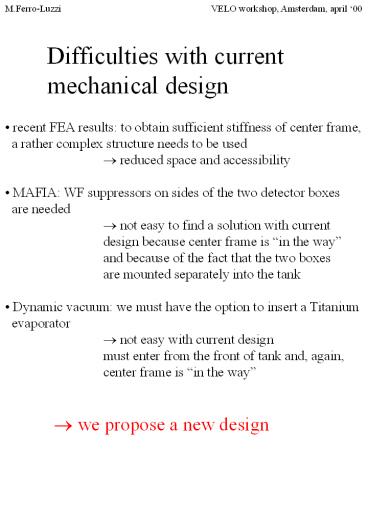Difficulties with current - PowerPoint PPT Presentation
Title:
Difficulties with current
Description:
... feedthroughs on the same big flange all cables and repeater cards on same side present choice of feedthrough limits total ... station alignment with ... surveying ... – PowerPoint PPT presentation
Number of Views:33
Avg rating:3.0/5.0
Title: Difficulties with current
1
Difficulties with current mechanical design
- recent FEA results to obtain sufficient
stiffness of center frame, - a rather complex structure needs to be used
- ? reduced space and accessibility
- MAFIA WF suppressors on sides of the two
detector boxes - are needed
- ? not easy to find a solution with current
- design because center frame is in the way
- and because of the fact that the two boxes
- are mounted separately into the tank
- Dynamic vacuum we must have the option to
insert a Titanium - evaporator
- ? not easy with current design
- must enter from the front of tank and, again,
- center frame is in the way
- ? we propose a new design
2
(No Transcript)
3
New tank frame design summary
- Plus points
- center frame much stiffer
- optimally positioned short legs,
- no more problems of bending
- not any longer in our way (more accessibility
to critical - items of VD, see below)
- all referencing is achieved with a much
simpler design - alignment and reproducibility
- VD easier to mount and position in the tank
- build in complete VD at once
- solves accessibility problem on one side of
the beam pipe - no more need of tilting mechanism during VD
installation - easier access to the critical WF suppressor
- more accessibility for connection to exit foil
4
New tank frame design summary (continued)
- Minus points
- re-do FEA calculations
- two detector boxes are not interchangeable any
longer - (but individual stations can be)
- all feedthroughs on the same big flange
- all cables and repeater cards on same side
- present choice of feedthrough limits total
number of pins - to about 25000 !!
Conclusion We like the new design.
5
NIKHEF VD responsibilities how do we currently
see it ? YES, ours NO, not ours (not
included here Pile-up and FEE)
- Cabling in vacuum
- provide FEE cabling from feedthroughs to some
available - connectors coming from the hybrids
- cabling for cooling system and control (see
definition below) - cabling for temperature control of stations
- we assume some group will take care of testing
the complete - electrical chain
- Alignment
- provide reference points for station alignment
with respect to - center frame
- provide reference points for external alignment
of boxes - guarantee internal alignment and reproducibility
of boxes - provide possibility to move the center frame via
a remote- - controllable XY-table
- interactive alignment with respect to beams
using tracking, - beam feedback control and XY-table
- internal alignment and reproducibility of
detector stations - we assume some group will take care of the
complete LHCb
6
NIKHEF VD responsibilities how do we currently
see it ? (continued) YES, ours NO, not
ours
- Cooling system and temperature control
- provide a complete cooling system heat
exchanger (pipes) - with sufficient cooling power at a fixed and
stable temperature - control and monitor of this cooling system
(hardware and - software)
- cooling, temperature control and monitor of the
stations - (though, we wish to be involved in this)
- VD vacuum (tank and detector boxes)
- provide important part of the vacuum system
(chambers, - flanges, feedthroughs), but
- we assume we do not have to provide the exit
foil (CERN) - we see the pumps, gauges, quadrupole mass
analyzers, and - LHC/VD interface valves as part of the
infrastructure - control and monitor of VD vacuum system
(hardware and - software).
- Note this has to be integrated with LHC
control system!
7
Timeline and Milestones (highlights)
strong impact on LEMIC (my
personal impression)
End April fix foil geometry and thickness
- manufacture and test self-
- opening valves
- design a Ti evaporator
- build and test cooling system
Early May formal approval by LHCb/VELO of VD
design
- manufacture prototype Al box,
- then leak pressure tests
- manufacture a WF suppressor
- model, perform RF studies
Mid May formal approval by LHCb of VD design
- build and test Ti evaporator
- complete testing (vacuum,
- RF, motion mechanics,
- cooling, etc.)
End June formal approval by LHC of VD design
(LEMIC?)
- start producing manufacturing
- drawings
- build control and monitoring
- systems
- etc.
End December draft TDR
8
Some questions, en vrac
Partial bake out of Al box to clean surfaces on
the beam side could we consider baking the box
(e.g. at 80-100 ºC) while cooling the stations
? what are the sensitive components in the Si
stations ? Temperature cycling of Si
stations What will happen to the Si stations ?
Beneficial ? Deteriorating ? (we assume its no
problem) // commented out... // Water
condensation on (cooled) stations // No problems
? (Si, FEE, bonding, etc.) // Vapour pressure at
-30 ºC is 10-1 mbar ? only monolayer. Radiation
resistance of carbon-fiber support
structures how good ? Vacuum design In case
one detector half must be turned off, do we want
to have the possibility to operate the other
half ? Cabling How many wires in total ? What
kind ? cable properties impedance, attenuation,
etc. (what for ? signal, power, control,
digital/analog, etc.) How will the grouping be
done ?































